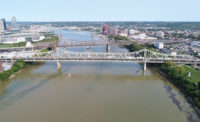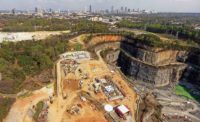Jordan’s Water and Irrigation Ministry has short-listed five teams, out of 17 original proposals, to submit definitive bids for the $1.1-billion first phase of the project to pump water from the Red Sea to the shrinking Dead Sea on the Israel-Jordan border. The work also will include boosted water and power supply facilities for the region, including a new desalination plant.
Consortia for the Red-Dead Sea Water Conveyance project are headed by the China National Technical Import and Export Corp., Hong Kong-based Hutchison Water International Holdings, Korea Water Resources Corp., Japan-based Mitsubishi Corp. and France’s Suez International SAS. Three Israeli companies active in the desalination-and-water sector also submitted proposals. A winner is expected to be announced in the first half of next year.
Israel and Jordan water agencies last year issued an international build-operate-transfer tender to prequalify firms to build the 65-million-cu-meter-per-year reverse-osmosis desalination plant and related infrastructure, a 170-kilometer pipeline for that plant's residual brine to the Dead Sea and a hydroelectric plant to supply 20% of the desal facility’s power.
Foreign donors will contribute more than $400 million of the project funding, including $100 million from the U.S., 40 million euros from the European Union and a loan of $120 million through the European Investment Bank and the French Development Agency. In addition, Japan, Italy and Spain have committed to funding.
The Jordanian ministry in a statement noted that the first stage, to include the desalination plant near the country's port of Aqaba, is due to begin in early 2018, with completion set for the end of 2020. Plans call for expanding the plant to 85 million cu m per year. The agreement signed late last year includes a water-swapping arrangement between the two countries, with Israel set to purchase more than half the plant's output and Jordan agreeing to buy water from the Sea of Galilee. The Palestinians also will receive water as part of the plan.
The project's most controversial element is the residual brine pipeline. In the initial phase, it will serve as a pilot to test the impact of mixing the waters of the Red Sea and Dead Sea to replenish the latter, as it is rapidly evaporating. Plans call for dumping about 100 mcm/year of brine into the Dead Sea.
But environmental groups have warned of substantial risks in mixing the waters, and they claim the pipeline will dramatically increase the cost of desalination.




Post a comment to this article
Report Abusive Comment